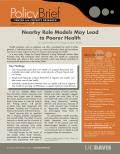Nearby Role Models May Lead to Poorer Health
by Elyse Kovalsky, 2012 Visiting Graduate Scholar
Health problems, such as diabetes, are often considered the result of either genetics or individual choices. In fact, our network of family, friends and co-workers can have a major impact on how we measure and manage our health.
In a new study, Center for Poverty Research Visiting Graduate Scholar Elyse Kovalsky finds that individuals often measure their own health by comparing themselves with others in their social networks, which may directly contribute to existing health disparities in the United States.
Key Findings
- One way people assess their own health is to compare themselves with available role models within their social networks of family, friends and co-workers.
- People most frequently compare themselves to negative role models, who take worse care of their health.
- Individuals create distance between their own health and that of negative role models by pointing out differences in specific behaviors and decisions.
In the U.S., diabetes affects more than 25 million. African Americans and Latinos have higher rates of diabetes than Asian Americans and whites, as do those living below or near the poverty line. Among Latinos, 11.8 percent of adults have been diagnosed with diabetes, including over 13 percent of Mexican Americans and Puerto Ricans.
Social networks play an important role in shaping diabetes management and overall health. The effect of social networks on health can be a function of their size, one’s relative degree of social isolation, the resources one’s social network makes available as well as role models within the network.
This brief focuses on the impact of role models within social networks, specifically the practice of comparing one’s own experiences with type 2 diabetes to those of family members, friends and others. Research suggests that people are most likely to be connected with others who are similar along many dimensions, including ethnicity and social class. Because of this, social networks may contribute to larger-scale health inequalities by encouraging these kinds of comparisons.
For policymakers, health providers and researchers interested in reducing health disparities and improving the health of the poorest and most disadvantaged members of society, it is critical to understand the impact social networks have on health as well as opportunities for intervention.
Living with Diabetes
This study drew on 40 in-depth interviews with Latino adults with
type 2 diabetes. The interviews were conducted from 2009-10 in
and around Chicago and the San Francisco Bay Area. Twenty-three
women and 17 men participated in the study, ranging in age from
33 to 70. Education levels varied from functionally illiterate to
a bachelors or other advanced degree. Each participant was
receiving regular medical care for his or her diabetes.
In addition to interviews, researchers collected data on participants’ health management strategies, social support, interactions with medical professionals and assessments of general health and diabetes control.
Diabetes by Comparison
Of the 40 participants, 36 compared their experiences with
diabetes to that of “embedded role models”—individuals in their
social networks who have relevant health experiences, such as
diabetes or obesity. Positive embedded models were those doing
well by comparison, and were referenced by ten participants (25
percent). More commonly, participants described negative embedded
role models—family and friends doing poorly by comparison (75
percent). Participants explained the health of negative embedded
role models in one of two ways. Some offered economic
explanations for others’ poor diabetes health, citing economic
constraints such as lack of access to doctors or medication.
Use of Embedded Role Models
- 36 participants (90%) referenced “embedded role models,” which are individuals in their social networks who have relevant health experiences.
- 30 participants (75%) referenced others as negative embedded models. This was the most common use of embedded models.
- 10 participants (25%) described themselves as positive models for others in their social networks.
- 7 participants (18%) described themselves as a negative model, usually referring to past behaviors.
Participants more frequently explained the poor health of negative embedded role models in terms of individual choice. They used these explanations to “distance” themselves from these role models. Distancing is a strategy to emphasize the differences between one’s own health behaviors from those of another’s, often highlighting others’ stigmatized behaviors and ignoring similarities. Participants most often made these comparisons between themselves and those in extremely poor health, such as those who had experienced serious diabetes complications, including amputations.
Researchers interviewed a 66-year-old woman diagnosed with diabetes 10 years ago who has poor diabetes health management. She referenced several negative embedded role models: “I started to see people who had their foot cut off, and I said, that’s what happened to my brother. Why did that happen to my brother? Well it wasn’t because the disease was so very bad. Maybe it was bad, the disease, but also he never took care of himself. He was very stupid.”
Her brother’s example might have motivated careful management of her diabetes, but instead she distanced herself from her brother’s example. In her own care she avoided checking her blood sugar, did not exercise and described a diet that left her blood sugar levels out of control. Still, she emphasized her brother’s behaviors that differed from her own, such as his smoking and drinking coffee with regular sugar. She understood diabetes to be a serious health condition that could negatively impact her life, yet her diabetes health management remained poor.
The Importance of the Social Network
This study suggests that embedded role models are frequently used
as points of comparison for assessing one’s health. They work
alongside other determinants of health to frame a health
condition and influence health beliefs, decisions and behaviors.
Public health campaigns and initiatives to address health
disparities should acknowledge the role of embedded role models
in their health messaging. Health providers can also inquire
about their patients’ embedded role models, and can discuss the
range of tools a patient has for assessing his or her health.
The practice of comparing oneself to embedded role models at the individual level may also have implications at the community level, especially in areas with a high prevalence of health conditions like diabetes. In these communities, there may be greater opportunities to distance oneself from negative embedded models, and to assess one’s health using points of comparison that lead to good diabetes health management.
Meet the Researcher
Elyse Kovalsky is a Ph.D. candidate in Sociology at
Northwestern University and was a 2012 Visiting Graduate Scholar
at the Center for Poverty Research. Her research interests
include inequality and stratification, health and health
disparities and social policy.
About the Visiting Graduate Scholars Program
Each year, the Center hosts Ph.D. students from across the
country as Visiting Graduate Scholars to conduct poverty research
in a variety of disciplines, including economics, psychology,
sociology, social work, public policy, law and education. Their
coursework and research during their stay expands their
understanding of the causes and consequences of poverty, and
offers faculty mentorship and support in their work.
References
National Health Interview Survey, Centers for Disease Control
2011.












